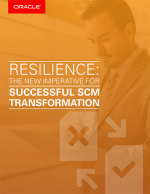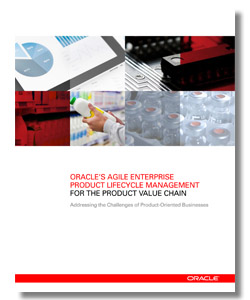Oracle’s Agile Enterprise Product Lifecycle Management for the Product Value Chain
Addressing the Challenges of Product-Oriented Businesses
Enterprise Product Lifecycle Management (PLM) is a strategic approach to managing the entire lifecycle of a product, from the ideation phase of initial requirements-gathering through to design, prototyping, certification, production, customization, service, recycling, and retirement.
Enterprise PLM is much more than a technology solution. It represents a new, strategic approach to the product value chain that emphasizes process efficiency, crossfunctional collaboration, rapid innovation, rigorous quality control, risk mitigation, and cost-effectiveness.
Adopting an Enterprise PLM approach can help you:
- Drive innovation strategies
- Reduce operational and product costs
- Improve product quality
- Speed time to market
- Develop a leaner, more efficient value chain
- Simplify compliance
- Increase profitability
- Enhance insight and improve decision-making
Log in to download this paper.
What’s Related
Related Companies
Oracle
Related Topics
Global TradeService LifecycleNews
eBooksEnterprise Resource PlanningGlobal TradeOracleOtherProduct Lifecycle ManagementService LifecycleSupply Chain
All topics
News



Enterprise Resource Planning Gains Ground Into the Supply Chain Management Sector
On track to hit $78.4 billion in revenues by 2026, the global enterprise resource planning market is increasingly making its way into the supply chain management sector, where comp...
Resilient Supply Chains in a Politically Uncertain World
Why Supply Chain Leaders Are Migrating to The Cloud
Growing Cyber Threats Drive Need for Advanced Data Protection Defenses Investments
Enabling Smart Manufacturing with New Artificial Intelligence Cloud Applications
More News
Resources
IDC Research Report Quantifies Value of Cloud for SCM
What’s the payoff for cloud-based supply chain management?
Why Supply Chain Leaders are Moving to the Cloud: Six Top Reasons
Cloud has changed the supply chain game, and organizations that are slow to adapt risk getting left behind.

Resilience: The New Imperative for Successful Supply Chain Management Transformation
In this eBook we describe how supply chain resilience is used to; transform to support an outside-in, demand-driven operating model, respond to demand rather than forecasts and adj...
More Resources
Favorites

How Does IKEA’s Inventory Management Supply Chain Strategy Really Work?
Each IKEA store is huge and holds more than 9,500 products! How in the world does IKEA offer so...

Starbucks as an Example of the Value Chain Model
The concept of value chain helps to understand and segregate the useful (which help in gaining a competitive...

7 Principles of Supply Chain Management Explained
Would you like to understand supply chain management concepts but don't have time to study from a textbook?...

Is Apple’s Supply Chain Really the No. 1? A Case Study
How Complex is Apple's Supply Chain? Some people in the blogosphere said that Apple's Supply Chain is not...

